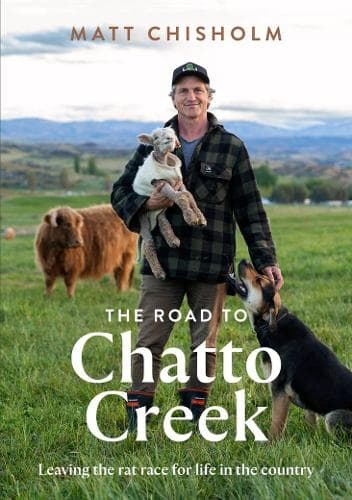Review: The Road to Chatto Creek, by Matt Chisholm
Reviewed by Wendy Macaskill
This review is from our monthly series of reviews by LIANZA members.
In Road to Chatto Creek Matt Chisholm uses his innate skills as a storyteller, developed over his years as a television journalist, to tell a story of “The Land”, his beloved property at Chatto Creek in heartland Central Otago. This book is for anyone who dreams of owning a farm, lives and works on a farm or has been a farmer. But it’s more than that: it’s also an ode to mateship, the beauty of our whenua and an open and honest account of one man’s struggles with mental health and anxiety.
Chisholm leads the reader straight into the realities of farming life, hilariously and accurately describing the frustration of moving lambs just a day after weaning them from their mothers. Anyone who has participated in, or observed this experience, in any role, will be immediately drawn into the book. And that’s before we hear about the subsequent exhaustion of Shade the dog, and the running over of the irrigation line and two lambs with the Hilux ute. Spoiler alert for the squeamish - the lambs survive.
Readers of Chisholm’s first best selling book Imposter, looking for the intricacies of male mental health, will find plenty of interest along with the introduction to realities of farm life. Although there’s a recap of the first book in the second chapter, this book can happily be read as a stand alone title. But this isn’t a rose tinted story about someone who has lived life in the city moving to a few acres for a bucolic lifestyle. The Chisholms now own 29 ha (72 acres) of land and successfully breed sheep and cattle.
Confronting for some readers will be the realities of the heartbreak of losing ewes to sleepy sickness, losing lambs and calves at birth, the challenge of drought and the sheer hard work of farming livestock. Life on a farm can ‘break your heart, and melt it, all in the same day’. However, Chisholm’s joy in sharing this life with his young family, and the wins he receives in showing and selling his stock, is palpable and engaging.
However, the author makes it clear that for him, farming can never be more than a hobby. This book also outlines how Chisholm has been able to turn negative experiences into positive to become in demand as a MC and speaker all over the country. As in Imposter Chisholm is honest about his struggles with mental health and anxiety; this openness, and his sense of humour, has obviously been foundational to his success as a speaker.
The author introduces us to a diverse range of friends and relations who have provided the family with support and companionship with often no expectation of reward, but is reciprocated by his own work for charities and friends. It appears that the great Southern Man is not a myth.
Beautiful landscape images by Lottie Hedley, evocative of Graham Sydney paintings, do not shy away from showing the reality of farming but add texture and interest to the book overall. It’s an easy read, the plotting uncomplicated, although when Chisholm outlines the complexity of “breeding up” the timeline becomes slightly confusing, but this is minor. The Road to Chatto Creek is bound to be a winner for the Father’s Day market and rightly so.
Reviewed by Wendy Macaskill
